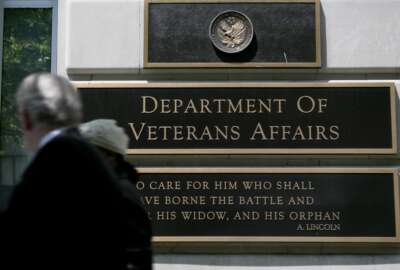First Look
Lawmakers renew push to strip investigation authority from VA whistleblower office
The bill, if passed, would cease all of the Office of Accountability and Whistleblower Protection’s ongoing investigations of whistleblower retaliation and th...
UPDATE: This story was updated at 8:13 p.m. on Thursday, June 16 to include comments from the House Veterans Affairs Committee’s subcommittee on oversight and investigations and the Senior Executives Association.
A whistleblower office at the Department of Veterans Affairs once again faces the possibility of a significant restructuring, only a few years into its existence.
Members of the House Veterans Affairs Committee’s subcommittee on oversight and investigations are revisiting legislation that would eliminate the Office of Accountability and Whistleblower Protection’s statutory authority to investigate whistleblower retaliation complaints.
A discussion draft of the bill, if passed, would cease all of OAWP’s ongoing investigations of whistleblower retaliation. Instead, the Office of Special Counsel would take on this workload.
VA employees can already file whistleblower retaliation complaints with OSC.
The bill’s discussion draft would also give OAWP its own general counsel, which oversight and whistleblower advocacy groups claim would help the office maintain more independence from the rest of the agency.
OAWP relies on VA’s general counsel to provide legal advice, but some members of the subcommittee said that arrangement creates a probable conflict of interest, because of the general counsel’s role of defending the VA from whistleblower allegations.
Subcommittee Chairman Chris Pappas (D-N.H.) said VA leadership has committed to strengthening whistleblower protections, but said the agency must do more to earn the trust of whistleblowers.
“We need to see permanent changes to policies and procedures, including through improved laws,” Pappas said.
OAWP in 2021 made 15 recommendations for disciplinary action against employees, but Pappas said VA only acted on five of those recommendations, and only one was fully implemented.
“It is clear to me that the Office has not been performing at the level Congress or the secretary should expect,” subcommittee Ranking Member Tracey Mann (R-Kan.) said. “This is a sustained reality of the office, despite different leaders and administrations.”
Maryanne Donaghy, who currently leads OAWP, said her office remains “committed to the holistic continuous improvement of whistleblower protection,” but said the VA does not need legislation to make reform possible.
“We do not believe the statutory authority is needed for making some of the important suggestions that have been made,” Donaghy said.
“I am always supportive of continuous improvement and suggestions to make that happen. But even more, the transparency to me has given this office, and me personally, excellent suggestions. I see it as my job to execute on that and I believe we’d done that,” Donaghy said.
Thursday’s hearing on reforming OAWP and strengthening its independence echoes similar hearings held in 2019 and 2021.
In 2019, the subcommittee heard testimony from three employees who suffered retaliation after blowing the whistle, including the loss of their positions at VA.
“For these three individuals, the weight for justice is measured in years,” Pappas said.
The bill would clarify some whistleblower protections, such as ensuring that senior agency employees that blow the whistle are protected. It would also clarify the scope of current training for VA employees regarding the rights and responsibilities of whistleblowers.
“There’s this desire now to sort of look at what have we learned, what has the VA learned, since those two hearings,” a committee aide told Federal News Network.
OAWP on its website states that between this January and May, it has issued 11 disciplinary recommendations against VA senior leaders for misconduct or poor performance, and six disciplinary recommendations against senior leaders and supervisors for whistleblower retaliation.
Committee Chairman Mark Takano (D-Calif.) said he believes the VA’s leadership is “trying to move in the right direction” and protect whistleblowers, but said the supports the legislation to reform OAWP.
“We are simply not where we ought to be. I’m very concerned that those retaliating against whistleblowers are not facing the consequences for their actions,” Takano said.
The current discussion draft of the bill combines two bills previously considered by subcommittee members.
Elizabeth McMurray, chief of OSC’s Retaliation and Disclosure Unit, said the VA consistently represents roughly a third of its workload. McMurray said OSC has not seen a decrease in its VA caseload since the creation of OAWP.
“We don’t have any reason to believe that the proposed legislation would impact our dockets,” she said.
The committee aide said it helps that there is a “different set of leadership that is more intent on helping us,” but said lawmakers still seek protections and protocols for OAWP that are not yet codified in law.
While no VA whistleblowers testified during Thursday’s hearing, the committee aide said that updates to whistleblower cases the committee has previously heard demonstrate the need for legislative changes.
“Those results have been inconsistent, and I think that’s concerning for us. Some of the individuals have had their cases settled, and they aren’t totally satisfied, but they got their jobs back. Some are still waiting, it’s been four years, and so the committee is very concerned about that,” the aide said.
The bill underscores the subcommittee’s frustration that the OAWP to date has not been the independent office within VA that lawmakers expected it to be when Congress passed the 2017 Accountability and Whistleblower Protection Act.
“The past couple of years, we’ve seen OAWP stray away from its original mission, and it’s got this investigative function, which is largely duplicative since OSC already provides this,” the committee aide said.
The committee aide said because both OAWP and OSC currently have the authority to investigate whistleblower retaliation cases, and OSC can further enforce action through the now fully staffed Merit Systems Protection Board “it makes sense to remove the duplicative powers.”
Previous OAWP leaders told the subcommittee at last year’s hearing that they’ve made progress since 2019, when the VA inspector general said the office failed to protect whistleblowers and often misinterpreted its statutory mission.
The Senior Executives Association, in a letter to the subcommittee, said it supports several provisions of the legislation, including eliminating OAWP’s investigatory functions.
SEA Executive Director Gregory Brooks wrote that OAWP’s current investigatory authority is “entirely duplicative of the VA OIG and OSC functions.”
“At best, these duplicative complaints unnecessarily expend taxpayer dollars. At worst, the complaints may result in conflicting investigatory outcomes and either create a bureaucratic paralysis or require further investigation to resolve the conflicts,” Brooks wrote.
Brooks said SEA also supports a provision of the legislation that provides whistleblower protection parity for VA senior executives.
“Because Senior Executives have broader purview and responsibility at the highest agency levels, they are better able to identify and expose the most serious agency wrongdoing than lower-level employees. But making those kinds of whistleblower disclosures is a risky endeavor for any employee,” Brooks wrote.
However, SEA also seeks clarity on what the bill specifies for OSC’s role in VA personnel actions, calling the language “confusing and unclear” on its intent.
Brooks clarified in the letter that the association opposes any language that would authorize OSC to unilaterally stay VA personnel actions.
Congress has never authorized OSC to be able to issue a binding decision for relief, nor has it required MSPB or an employing agency to enforce a unilateral decision of the OSC. Congress has limited OSC to functioning as an investigative and prosecutorial agency. MSPB is the adjudicative agency within the Title 5 framework, not OSC,” Brooks wrote.
“No agency should have all-powerful investigatory, prosecutorial, and binding adjudicative powers over the personnel actions in another agency,” he added.
Copyright © 2024 Federal News Network. All rights reserved. This website is not intended for users located within the European Economic Area.
Jory Heckman is a reporter at Federal News Network covering U.S. Postal Service, IRS, big data and technology issues.
Follow @jheckmanWFED






